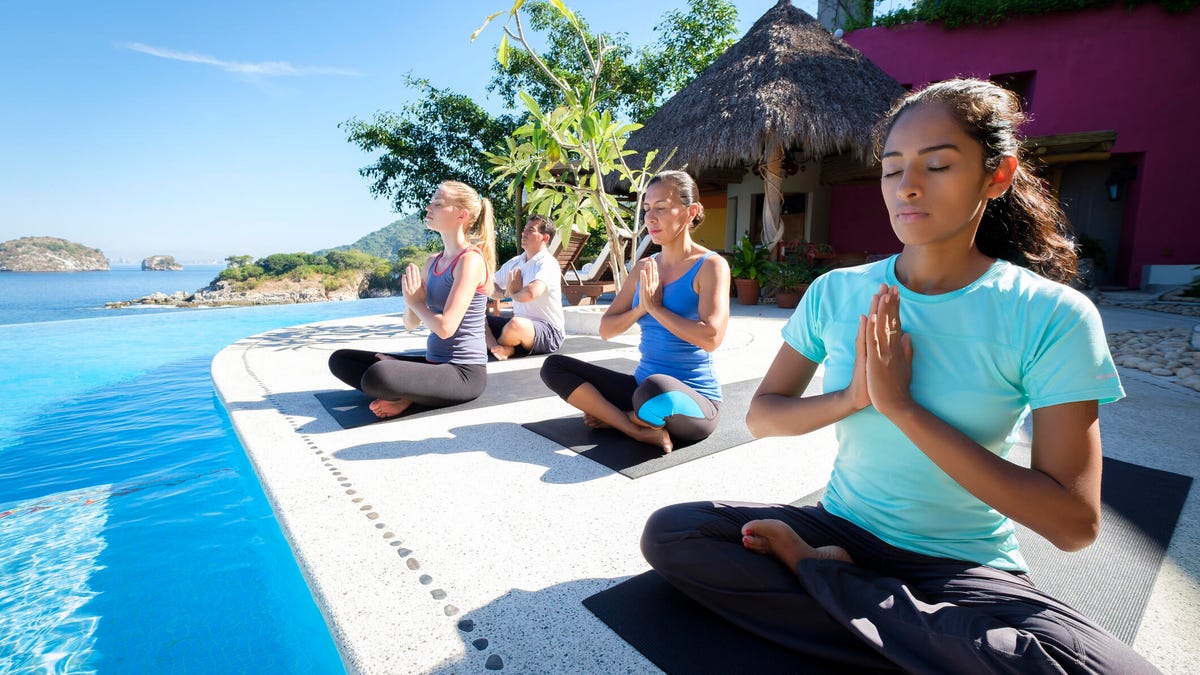Meditation and yoga retreats: Why you should take a wellness vacation
Social media detoxes, silent meditation classes and yoga workshops can all ease stress and help you truly relax on vacation.

Yoga retreats might be the new best wellness product.
The wellness industry is now worth $4.2 trillion, and that number will increase in 2020. At CES this year, we saw an influx of cool new wellness products, including inject makeup printers, non-invasive blood glucose monitor and plant-based pork.
However, the biggest growth in the wellness industry may not come from products like these. Instead, more and more people are turning away from material goods and towards intangible experiential wellness, like choosing an in-person fitness class instead of a treadmill for the garage.
Over 70% of millennials surveyed prefer buying experiences over real things, so you can surely expect this trend to grow. It's a first world problem, but as the younger generations increasingly feel like they own too much stuff, they're turning to immersive experiences instead.
Read more: Best yoga mat for 2020
What is experiential wellness?
Wellness retreats can include meditation, yoga, hiking and other physical activities.
Experiential wellness sounds like a fancy term, but it's really quite simple. Instead of buying a product designed to improve your health -- anything from a 10-second toothbrush to a plant-based burger -- you purchase an intangible experience that'll also benefit your overall well-being in some way.
Experiential wellness covers a broad variety of activities, including everything from a day at the spa to a week-long silent meditation retreat. There are conferences too, where you can learn how to use tech and nutrition to optimize your health, fitness-filled weekends and more.
What should I expect in a wellness experience?
This really depends on what kind of experience you've signed up for. For most retreats or events, you can generally expect to participate in workouts, yoga classes and/or meditation sessions, listen to speakers, attend workshops and panels, eat healthy meals and spend time with other attendees.
For example, I went to a day-long meditation retreat at Spirit Rock, a Bay Area-based meditation center, over the New Year holiday. I was there for six hours, and spent about thirty minutes total meditating. The rest was spent listening to insightful speakers and beautiful music. It wasn't what I was expecting, but it was certainly a learning experience.
At wellness conferences, like Upgrade Labs' Biohacking Conference, attendees can take fitness classes.
Some other wellness experiences are pretty similar. For example, at the Upgrade Labs Biohacking Conference, the weekend will consist mostly of panels and talks from industry experts.
At The Ranch, a fitness retreat in California, expect intense fitness classes and a "carefully calibrated plant-based diet". The Ranch also doubles as a social-media detox, which is sure to leave you feeling refreshed upon leaving.
At Tennessee's Well Being Retreat Center, you can sign up for a weekend-long silent meditation retreat. Participants do silent sittings and guided meditations, and also have unstructured time to nap, take a stroll in the woods or read a book. It's also free, provided you bring one meal for a group of 8-16 to share.
Why should I try a wellness retreat?
A lot of these wellness retreats are fairly pricey, so you may be wondering if any of them are even worth it. There's no answer that works for everyone -- it depends on your budget, availability and personal wellness goals.
In my opinion, there's a strong argument to be made that wellness retreats are only worth the cost if you've exhausted your own personal resources and need the help of an expert to progress. For example, if you've never meditated before, a better option would be to download a meditation app and try it out for a while. If meditation becomes your new passion and you want to go to a week-long silent retreat to boost your progress, then go for it.
Wellness retreats give you the chance to relax and work on yourself, often in a beautiful environment.
The problem with diving into a wellness retreat when you have limited experience in the area is that the lessons you learn can be challenging to implement into everyday life. A weekend where all you do is work out and cook healthy meals is fantastic, but when will you ever have time like that at home? Your best bet is to learn how to consistently exercise and eat nutritious food in the context of your regular life.
However, if a wellness retreat sounds like a dreamy vacation to you, then by all means you should try one out.
How do I sign up for these retreats?
The easiest way to sign up for a retreat is to pick a type of wellness retreat (yoga, meditation, fitness, biohacking, etc.) you're interested in and Google if there's one near you.
If you don't know where to start, there's several handy guides online, like Goop's list of best wellness retreats in the US that's broken down by geographic region. BookRetreats also has a useful way to find a retreat based on where you are and what you're looking for -- it'll take into account your budget, activity preferences, dietary needs and more.
And don't fret if you don't live near a major city. I live a few hours away from any metropolitan center, and I was still able to find several wellness and yoga retreats within driving distance.

